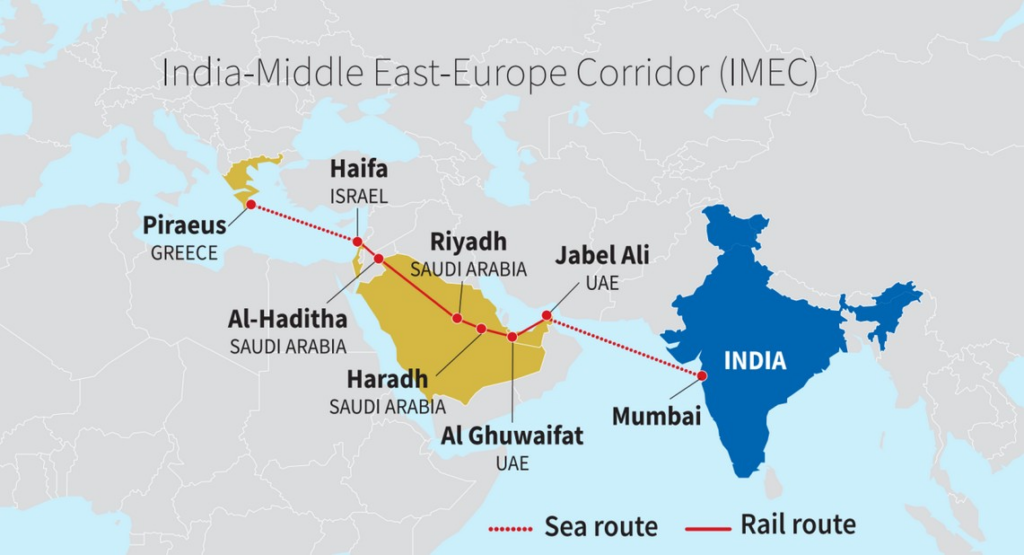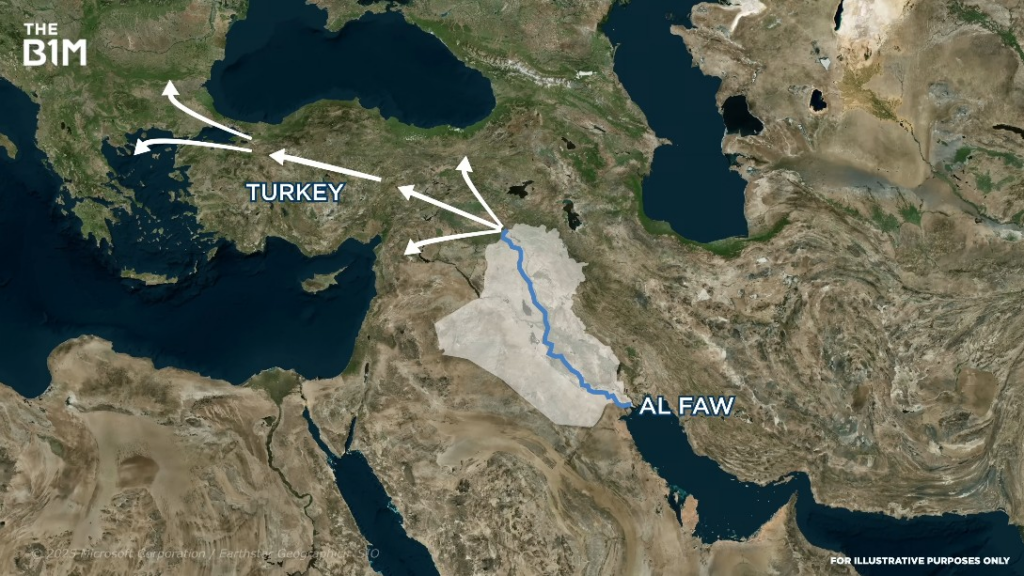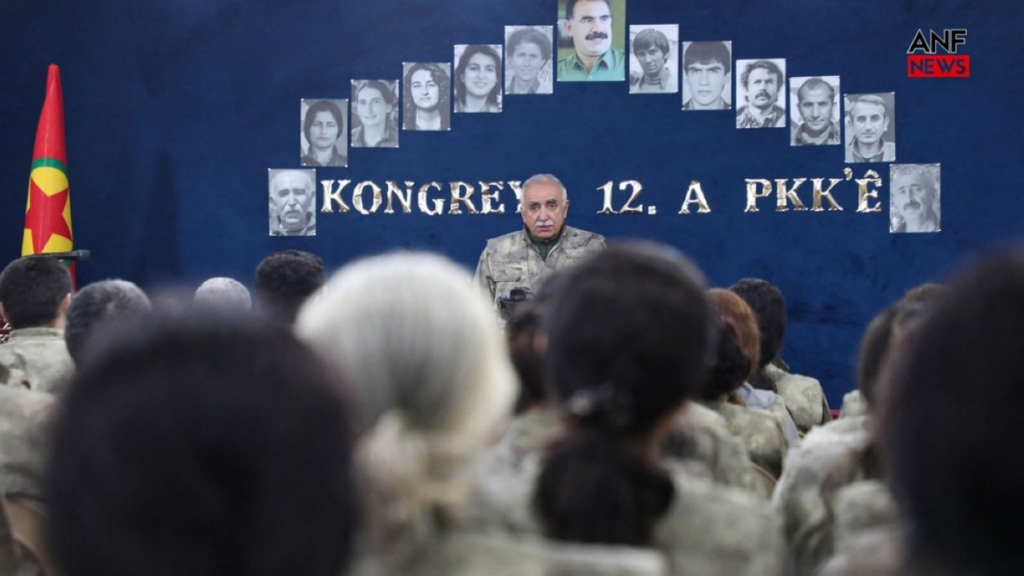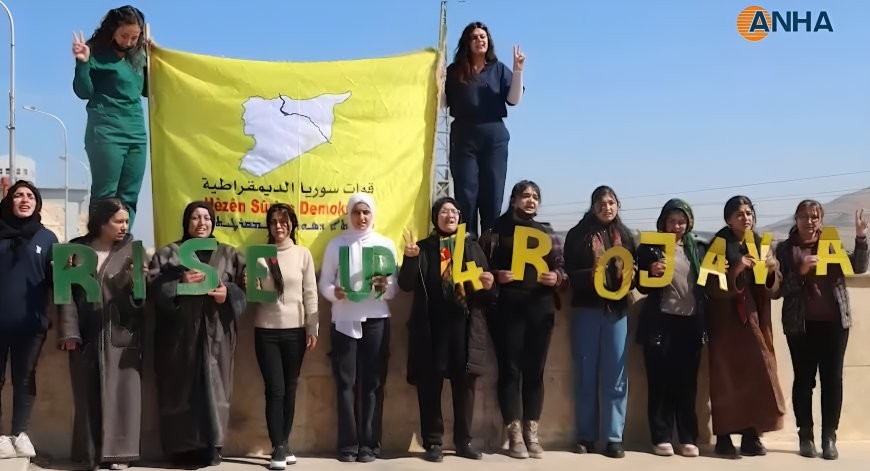Red Lines and Opportunities: Overcoming war in Kurdistan
Analysis by Riseup4Rojava, 20.11.2025
Ten years have passed since the Turkish state broke the negotiation table with the Kurdish Freedom Movement and implemented a concept of war that aimed at the total destruction or surrender of the PKK and the Kurdish Freedom Movement. Despite immense repression, large scale military operations, and systematic efforts at annihilation, the Kurdish Freedom Movement has not been broken.
After a decade of intense war, a new political processes that holds the potential to reshape the future of Kurdistan and the Middle East has been started. Understanding this moment requires an overview of what has been achieved in the last months but also what has happened in the last 10 years, and what transformations are now underway.
A Decade of all-out War and Resistance
Since 2015, the Turkish state has carried out a comprehensive campaign to eliminate the Kurdish Freedom Movement. It aimed to crush political organization in Northern Kurdistan and Turkey, to occupy revolutionary territories in Rojava/North-East Syria, and to encircle and destroy the guerrilla in the mountains of Southern Kurdistan. Tens of thousands of activists, journalists, and politicians were imprisoned; and Turkey launched invasions into Northern Syria – Jarablus in 2016, Afrîn in 2018, and Girê Spî and Serêkanîyê in 2019. These attacks, along with continuous airstrikes and the occupation of parts of Southern Kurdistan, are part of the strategy of annihilation which the Turkish state used to call “The Kneefall plan”.
Each year, the AKP-MHP regime in Ankara declared that victory was imminent, that the movement was on the verge of defeat. Yet after ten years of war, the facts are clear: Turkish fascism failed in its central goal. The movement has not been destroyed; Rojava has not fallen; and the guerrilla continue to hold their strongholds in the mountains. Despite mass arrests, torture, forced exile, and the displacement of millions, the revolutionary will of the people remains unbroken. In Northern Kurdistan and Turkey, a powerful political consciousness endures. In Rojava, the people have defended their revolution despite ten years of war, siege and embargo. The popular resistance during the battles at the Tishreen dam this year once again demonstrated that this revolution rests on the power of the people and their self-defense. The Assad regime relying on foreign powers, namely Russia and Iran was wiped away in only 12 days while the liberated territories in North-East Syria prevailed.
The Stalemate and its Meaning
In Southern Kurdistan (Iraq) the Turkish state has been able to occupy wide parts of the mountain areas and constructed close to 130 military posts and bases, some of them in important strategic positions. But they have not been able to break the resistance of the guerrilla. They have neither been able to enter into the military center of the guerrilla in Garê. Nor have they been able to enter the political center of the revolutionary movement in Qandîl. Eventually they have not been able to completely fulfill their plans in the mountains. The result is a military and political stalemate: the Turkish army cannot destroy the guerrilla, and the guerrilla cannot yet drive out the occupiers. Acknowledging the balance of forces, this stalemate is in itself a huge success. The Kurdish Freedom Movement, facing NATO’s second-largest army and the technological and financial power of the alliance behind it, remains undefeated. This outcome is a victory of the people’s will and of the international solidarity. In fact the last 10 years of war also pushed Turkey to its limits. The country’s economy is on the brink with inflation-rates going up to 80 percent. The country is more and more isolated and has diplomatic problems with many neighboring states and international powers because of the conflict and war with the Kurdish Freedom Movement. Even at home, the Turkish state is not anymore able to continue its policy of war as the society is rejecting it due to the economic crisis the war has caused.
We can conclude that the Kurdish Freedom Movement has been able to force the Turkish state onto the negotiation table. This by itself is a success for the revolutionary movement and a defeat for the Turkish state.
Shifting Geopolitics of the Middle East
To understand the present phase, we must see it within the broader transformations reshaping the Middle East. The Middle East that we knew 10 years ago does not exist anymore. If we look at the geopolitical situation and general political conjuncture in the Middle East we can see another reason for the Turkish state to enter negotiations with Abdullah Öcalan and the Kurdish Freedom Movement. The Middle East is in this time undergoing profound changes to a historical extend which until now can not even completely be foreseen. Especially since the Israeli aggression from October 7th 2023 onward, the attacks on Lebanon, Syria, Iraq and Iran are changing the face of the Middle East.
For decades, Turkey served as NATO’s southeastern flank – the alliance’s “gendarmerie” in the Middle East. Its geo-strategic location gave it leverage over Europe and the United States. However, the shifting patterns of global trade and power have begun to undermine that position. Modern global production depends on fast trade routes between Asia and Europe. When Russia’s 2022 invasion of Ukraine disrupted the northern transport corridor, Turkey hoped to become the key bridge between East and West. Yet the announcement of the India–Middle East–Europe Economic Corridor (IMEC) in 2023 changed the equation. The IMEC connects India to Europe via the United Arab Emirates, Israel, and Greece—bypassing Turkey entirely.

This project directly challenges Turkey’s long-standing ambition to be the central transit route between Asia and Europe. Ankara’s own “Iraq Development Road,” first proposed in 2010, would connect the “Al Faw Port” in the Southern Iraqi city Basra to the Turkish border and on to Europe. But instability caused by Turkey’s ongoing war in Kurdistan has made international investment impossible. The route passes through areas affected by clashes between Turkish forces and the Guerrilla – making the corridor too risky for global capital.

Unable to stabilize Kurdistan or solve the Kurdish question, Turkey has been pushed to the margins of new regional trade strategies. In contrast Israel, empowered through the Abraham Accords since 2020, has emerged as Washington’s primary regional partner. The USA now relies less on Turkey and increasingly on Israel to enforce its hegemony in the Middle East.
The Turkish state faced a dilemma: either confront US-Israeli plans directly, risking isolation, or submit to the new order. It is in this frame that Devlet Bahçeli, leader of Turkey’s fascist MHP, in October 2024 called on the leader of the Kurdish freedom movement, Abdullah Öcalan, to put an end to the armed struggle. Bahçeli was talking about the necessity to secure the “inner front” of Turkey, saying that “we are living in times in which Turkey is under heavy attacks from the outside”, thus making it essential to “secure the inner fortress”.
When taking the regime change in Syria into account this analysis shows to be true. Why did the Assad regime fall? Rather than promoting national unity grounded in equality, Assad built a repressive system dominated by a small ethnic minority which left them vulnerable to foreign intervention.
In the Middle East any kind of state that has not been able to create unity between the different nationalities, peoples and sects always had an open flank to foreign intervention, and Turkey also knows this. Yes, despite changes in rhetoric and small steps toward the Kurdish movement, Turkish fascism’s mentality remains unchanged. What happened is not an profound ideological change. The changed geopolitical situation and the fact that the Turkish state has not been able to break the resistance of the Kurdish Freedom Movement has forced it to the negotiation table. The Turkish states actions must be understood in this geopolitical context – not as signs of democratization, but as an attempt to consolidate the regime’s position under new global conditions.
Even though the intentions of the Turkish state are not favoring democratization, the process may in the long run open up historical chances for the democratic forces inside of Turkey.
The Negotiation Process: Öcalan’s Initiative
In this climate of stalemate and shifting alliances, the call of Abdullah Öcalan on 27 February 2025 to dissolve the PKK and end the armed struggle marked a turning point. Öcalan’s call aimed not at surrender, but at opening a political path to transform the struggle under new conditions. The movement responded positively: on 1 March 2025, it declared a unilateral ceasefire, pledging to act only in self-defense. For months, Turkey ignored the initiative and continued military operations in the mountains of Zap, Metîna, and Avaşîn. Guerrilla units resisted ongoing airstrikes and ground assaults until July, when hostilities finally subsided. Since July 2025, the situation has remained relatively stable. It cannot be described as a genuine two-sided ceasefire, as there is no official agreement signed by the Turkish state. Nevertheless, direct clashes and airstrikes in the mountains have ceased. The Turkish army has instead focused on reinforcing its existing positions and rotating troops, while continuing reconnaissance operations with drones across the region.
It must be clear that for the Turkish state, this is not a process aimed at peace or a genuine solution. Its goal is merely to reduce external pressure and buy time. The enemy remains the same – still intent on destroying the gains of the revolution and weakening the movement wherever possible. If given the opportunity, they will strike again. For this reason, the guerrilla forces have preserved all their defensive positions throughout Southern Kurdistan.

Rojava is a Red Line
The ceasefire, despite being one-sided, created space for new political dynamics. In Syria, Öcalan’s call provided the foundation for the 10th of March agreement between the Syrian Democratic Forces (SDF) and Hay’at Tahrir al-Sham (HTS), leading to a ceasefire on several frontlines. The later ceasefire around the Tishreen Dam in April 2025 was a direct outcome of negotiations influenced by the discussions between Öcalan and the Turkish state.
Öcalan made clear that any political process must recognize the achievements of the Rojava Revolution. This was his red line during the earlier peace process of 2013–2015, and it remains so today. The revolution in North and East Syria, built on Democracy, Women’s Freedom and Ecology would never be sacrificed for temporary political gains.
Transformation, not Capitulation
When the PKK’s 12th Congress announced the organization’s dissolution in mid-2025, it emphasized that this was not an end, but a transformation. The movement seeks to reorganize itself politically and ideologically, adapting its forms of struggle to the current realities and the Paradigm of Democratic Modernity.
After years of intense conflict, this phase allows the movement to regroup, analyze, and prepare strategically for the coming period. Many experienced cadres have fallen, and entire generations of militants have fought continuously without rest or space for reflection. The current process therefore serves both political, philosophical and organizational renewal.

The symbolic burning of weapons on 11th July 2025 expressed the movement’s commitment to peace and its moral strength. It demonstrated clearly that the desire for an end of the war comes from the revolutionary side, not from the state. Yet the Turkish regime has taken no meaningful steps in return. Öcalan remains in isolation on Imralı Island; no judicial or constitutional guarantees have been offered. Meanwhile Turkish officials continue to demand unconditional surrender. Under such circumstances, the guerrilla rightly maintain their defensive positions in the mountains.
On 26th October 2025, the movement announced the withdrawal of all guerrilla units from Turkish territory to the mountains of Southern Kurdistan. This step aims both to reduce the potential for provocation and to reinforce the political process. It is a tactical move to maintain initiative and push the strategy forward.
The Turkish state has not given any kind of guarantees but is continuing to call for a surrender. Of course under these kind of conditions it is not possible for the guerrilla to step down from the mountains or to just lay down the weapons and give up onto self-defense.
Rojava and the Question of Self-Defense
In the current talks on integrating the self-defence forces of the SDF, of YPG and YPJ into the Syrian army, disarmament is not on the table. The SDF (Syrian Democratic Forces) may be integrated into the Syrian army, but that does not mean they are getting disarmed. Instead they need to be integrated as an own military faction into the Syrian army. As separate battalions they will continue to defend the same territories. This is clearly necessary. Talking about integration does not mean that forces of the Syrian regime, of the islamists, would patrol in the cities of Rojava, but it would be the defense forces of North and East Syria securing the achievements of the revolution. Regarding the topic of the Women’s Defense Units YPJ: they are one of the most important achievements of the revolution that the women have fought and given huge sacrifices for during the 13 years of Revolution in Rojava. Accordingly a disarmament or dissolution of the women’s army is indisputable. The new Syrian regime put this as one condition in front of the movement, but it is clear that an integration can just be successful if also the existence of the autonomous defense forces of the women will be accepted.
Given the massacres committed against Alawite, Druze, and other communities in Southern Syria, demanding disarmament would be political suicide. The self-defense forces of North and East Syria are a guarantee of survival and dignity, not a threat to peace. Any lasting solution must acknowledge their legitimacy and permanence.
Global Context and Internationalism
As the network of Riseup4Rojava we dedicated the last years to find strategies and tactics to spread and defend the achievements of the revolution that have been reached through an immense struggle. This also continues to be our task in the future.
Now there are a lot of discussion happening inside the movement about how to continue the struggle in an international frame. As stated before, the process is taking place on the background of profound geopolitical changes of the region. But these changes are not just taking place in the Middle East. We are in these moments experiencing a global offensive of US-Imperialism. In Abya Yala (South America) for example similar developments are taking place as have been seen in the Middle East. The global rise in confrontation between imperialist powers, between different states and between different capital factions are leading our world to war on a global scale. Today, on more and more front lines, war is breaking out openly. That is the direction in which not just the Middle East, but our whole world is steering to. This is also the reason for the European states in which we are living in to continue to increase the repression towards the inside. The rise of authoritarian states is the consequence of an increased global confrontation: The more the confrontation to the outside, the more it is necessary for them to secure the inner front. That is one reason why we see the rise of fascist movements inside our countries.
That is why the movement and Abdullah Öcalan have been underlining the necessity to increase the networking, the common struggle – of revolutionary forces, socialist movements, democratic and anti-fascist forces around the world. It is necessary to strengthen this unity and to focus on common struggles and enemies. If we cannot unite and fail to join forces now, the future we are facing will be grim. That is a reality.
In forging the unity among us, we have been making valuable experiences as the Riseup4Rojava network. It is important to put the focus on political unity, respecting ideological differences and contradictions as well as the difference that we may have in our practice. But to unite in the focus on common political goals and the common enemy will build revolutionary internationalism. In the political unity we find a solution and an answer, not just to the situation in Kurdistan, but also to the global situation that we are facing in these times.
For the movement this moment is critical because this process is also holding a lot of dangers. It is not set in stone where this process is heading to. When it was started in 2024, it was started by the initiative of Abdullah Öcalan and the movement joined in. From the start, it was unclear how this process would unfold, and arriving at today’s point is not the outcome of some kind of natural course. Thus, what is going to happen tomorrow is dependent on the struggle.
When we evaluate the political situation of Syria or what will happen next in Northern Kurdistan and Turkey or in Europe, we do not just think about what our enemies are going to do, but focus on what we and our allies can do and how we can strengthen the movement. In the last 10 years the movement has survived because of the support of the people and its strategy of revolutionary people’s war. It has survived because of the international mobilizations that have taken place.

What we are going to achieve in the future, we will achieve with struggle!
What we have achieved in the last 10 years we have achieved together. It was the people of Kurdistan, the people of Syria, the people of the Middle East that were fighting on the frontline, defending the revolution. As part of the global resistance movement we took up our task and became an important factor, creating the strength we needed for the achievements of the last ten years. Whatever has been achieved, was achieved through struggle. What we are going to win in the future, we will win with struggle. Therefore, even if it is not clear where the process is going to go, it is more than important to take a position as internationalists and revolutionary forces. It is important to develop new positions and strategies.
In the spirit of 21st century internationalism we call to join the global resistance movement, to defend the revolution of Rojava and Kurdistan and to join Riseup4Rojava!
